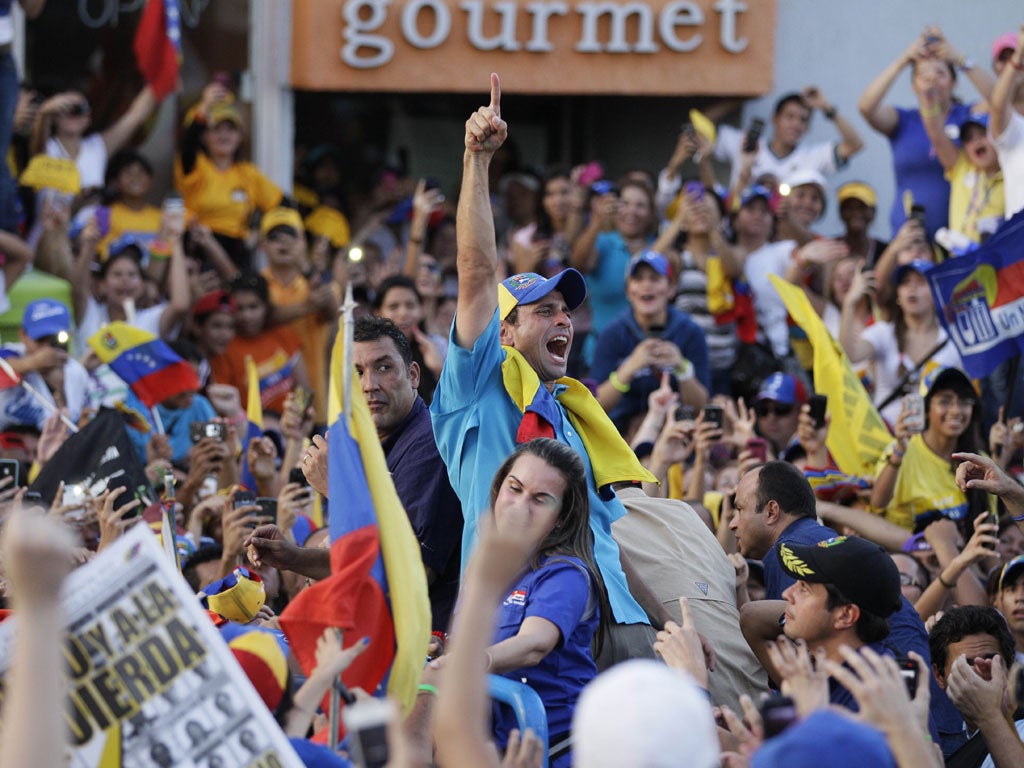Chávez battles it out with young rival in presidential election

Judging by the heated rhetoric, Venezuelan President Hugo Chávez could not be taking the challenge from opposition candidate Henrique Capriles more seriously. Even by his own strident standards, the president's recent warning to Venezuela's moneyed classes to vote for him or face "civil war" was inflammatory.
Denying he was intimidating opposition voters, the man Venezuelans call "el Comandante" claimed Mr Capriles (a telegenic, youthful, centrist former state governor) secretly plans to dismantle welfare programmes for the poor, a move Mr Chávez said would trigger a dangerous backlash.
"Who could think that the people would remain with their arms crossed if they take away their acquired rights?" the president asked. Yet the real reason for Mr Chávez's outburst may be in the effective campaign that Mr Capriles, the first candidate backed by a unified opposition, has been running.
Bypassing the state media, whose coverage favours the president, Mr Capriles, 40, has been crisscrossing Venezuela since his nomination in February as the presidential candidate for Democratic Unity, an umbrella group that now includes all of the country's significant opposition parties, left and right.
And rather than shy away from the grittiest neighbourhoods that typically are pro-Chávez, Mr Capriles, wearing jeans, a T-shirt and baseball cap, has made a beeline to them, shaking hands and giving impromptu speeches on street corners.
He has also stayed on-message with an almost iron discipline, promising Venezuelans he will clean up the Augean stables of Venezuela's bloated bureaucracy. And rather than terminate them, Mr Capriles promises to finally bring the missing ingredient of efficiency to the "missions", Mr Chávez's vaunted social programs for the needy.
Still recovering from the pelvic cancer that has seen him operated on three times in Cuba in the last 12 months, Mr Chávez has been forced to campaign at a slower pace than usual, relying on government-run television to get his message to voters.
Popular among Venezuela's downtrodden masses, Mr Chávez, 58, remains the favourite to win. Targeting the neediest with free clinics, adult literacy programs, subsidised housing and cash hand-outs for pensioners and single mothers, the missions have cemented his place in the hearts of many of the country's underclass, as have his populist verbal assaults on the traditional elite.
Yet there is genuine uncertainty regarding the election's outcome. Of the country's 10 polling companies, six have been giving the president a huge lead of 15 or more points over Mr Capriles. Four have shown the pair in a statistical dead heat. Most have also shown the challenger gaining ground in recent weeks. As Venezuelans head to the polls on Sunday, the tensions are unlikely to end once the final vote has been counted.
Subscribe to Independent Premium to bookmark this article
Want to bookmark your favourite articles and stories to read or reference later? Start your Independent Premium subscription today.

Join our commenting forum
Join thought-provoking conversations, follow other Independent readers and see their replies